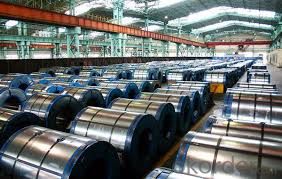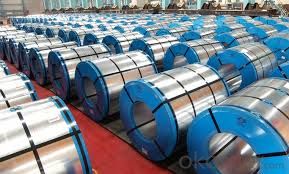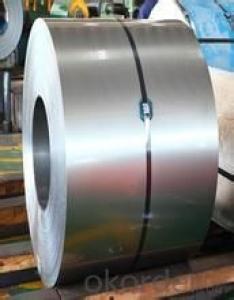excellent Cold rolled steel coil -SPCC in good quality
- Loading Port:
- China main port
- Payment Terms:
- TT OR LC
- Min Order Qty:
- 30 m.t.
- Supply Capability:
- 5000000 m.t./month
OKorder Service Pledge
OKorder Financial Service
You Might Also Like
Specification:
Product Name | Cold Rolled Sheet Coil |
Material | SPCC/SPCD/SPCE/DC01/ST12/ ST14/SPCD/DC03/DC04 ect. |
Grade Standard | JIS G3302, EN10142, ASTM653, ASTM95 |
Thickness | 0.15-3.5mm |
Width | 600mm-1500mm |
Coil ID | 508-610mm |
Coil OD | max 1500mm |
Weight | 3-10 Tons |
Tolerance | Thickness tolerance:+/-0.02mm; Width tolerance:+/-5mm |
Surface | No-skin passed or Skin passed, Tensile leveled |
Surface Treatment | Chromate/Unchromate passivation, fingerprint resistant treatment, oiled/unoiled |
Annual Output | 350,000MT |
Application | Construction, hardware, home applicances, interior decoration |
Main Features:
1. Commercial quality suitable for bending fabrication and simple forming; this is the type in greatest demand.
2. Drawing quality second only to that of SPCEN. Excellent uniformity.
3. Deep-drawing quality.With metallurgically controlled grain size, it retains its beautiful finish even after being deep-drawn.
4. Extra-low-carbon steel sheets with highest workability
Images:


Quality of the goods could be guaranteed. The finished product has a variety of excellent capabilities, such as continuous rolling, degreasing, annealing, skin pass, slitting and cut to length line etc. Along with it many rocessing capability and smooth, flat surface. It’s widely used in outdoor and interior decoration, furnishing
- Q:What are the common thickness tolerances for steel coils?
- The common thickness tolerances for steel coils usually range from +/- 0.001 to +/- 0.005 inches, depending on the specific industry standards and customer requirements.
- Q:How do steel coils contribute to energy efficiency in transportation?
- Steel coils contribute to energy efficiency in transportation in several ways. Firstly, steel coils are lightweight and have a high strength-to-weight ratio. This means that less steel material is required to carry the same load compared to other materials, such as wood or concrete. As a result, the overall weight of the transport vehicle is reduced, which leads to lower fuel consumption and emissions. Secondly, steel coils are highly durable and can withstand harsh conditions during transportation. They have excellent resistance to corrosion, impact, and fatigue, ensuring a longer lifespan for the transport vehicle. This durability reduces the need for frequent repairs or replacements, resulting in reduced energy consumption and material waste. Furthermore, steel coils are easy to handle and transport. They can be easily loaded and unloaded from trucks, trains, or ships due to their compact and standardized size. This efficiency in handling reduces the time and energy required for loading and unloading operations, thereby increasing overall transportation efficiency. Additionally, steel coils can be efficiently stacked and stored, maximizing the use of available space in transport vehicles. This reduces the number of trips required to transport the same amount of goods, resulting in less energy consumption and lower transportation costs. Lastly, steel is a highly recyclable material. At the end of their life cycle, steel coils can be easily recycled and used to produce new steel products. This reduces the demand for raw materials and the energy required for manufacturing new products, contributing to overall energy efficiency in transportation. In conclusion, steel coils contribute to energy efficiency in transportation through their lightweight, durable, easy-to-handle, and recyclable nature. These characteristics result in reduced fuel consumption, lower emissions, decreased maintenance needs, efficient use of space, and reduced material waste, all leading to a more sustainable and energy-efficient transportation system.
- Q:I'm going to buy a guitar for beginners and i wondered what strings are better steel or nylon?
- Yeah, you have some really bad answers here. You don't buy a nylon string guitar because you are a beginner, you buy one because you want to play classical music. You also cannot move between nylon and steel strings on the same guitar. Unless you want to play classical finger style music you need a steel string guitar. Just have extra light strings put on it and you can most likely have the action lowered a bit also, both of which will make it easier on the fingers. But the bottom line is this, if you want to play guitar you will have to go through a stage where you fingers get a little tender. Just keep your practice sessions short in the beginning, like 15 - 20 minutes at a time until the calluses build up.
- Q:i have been playing with hand me down graphite shaft irons and wedges. i was wondering if someone of my stature (5'3, 90 lbs., 12 years old) should be using steel shafted irons. i can definately swing them im just wondering if they are better for making contact
- It depends on your swing speed. If you have a faster swing speed and notice you are consistently hitting high with your irons and having some trouble with accuracy, you will benefit from playing steel shafted irons. If your swing speed is on the slower end of the spectrum, stick with the graphite irons for a couple more years until you swing has developed and you are hitting farther.
- Q:What are the common uses of coated steel coils?
- Coated steel coils are commonly used in various industries for applications such as automotive manufacturing, construction, and appliance production. These coils are utilized in the production of metal roofs, siding, garage doors, HVAC systems, and electrical appliances. The coating on the steel provides protection against corrosion, enhances durability, and improves aesthetics, making it an ideal choice for these applications.
- Q:What are the uses of galvanized steel coils?
- Galvanized steel coils are widely used in various industries for their durability and corrosion resistance. They are commonly used in construction for roofing, siding, and structural components. They are also used in the automotive industry for manufacturing parts such as body panels, chassis, and exhaust systems. Additionally, galvanized steel coils find applications in the manufacturing of appliances, agricultural equipment, and electrical enclosures.
- Q:My musical saw has, despite my best efforts, got little patches of rust on it. How Do I go about removing the rust without spending too much on rust-removal products and without affecting the properties of the steel?
- I would suggest rust removal by electrolysis. Search youtube for that. It probably will not affect the metal but there are no guarantees. I would run a test on another metal. Also this process can be dangerous because hydrogen gas is a by-product - remember not to smoke or be cooking nearby! The Easy way is with BlackStar Rust Remover. It will turn the metal black and convert the rust to metal which can then be painted or left black.
- Q:What is the maximum diameter of a steel coil?
- The maximum diameter of a steel coil varies depending on the specific type and thickness of the steel, as well as the capabilities of the manufacturer's equipment. However, in general, steel coils can have diameters ranging from a few inches to several feet.
- Q:How do steel coils contribute to corrosion resistance in products?
- Steel coils contribute to corrosion resistance in products by providing a protective layer that prevents direct contact between the steel surface and corrosive elements in the environment. The coil coating process involves applying a protective coating, such as zinc, to the steel surface, forming a barrier against moisture, chemicals, and other corrosive agents. This coating acts as a sacrificial layer, corroding in place of the steel, thereby extending the lifespan and enhancing the durability of the products.
- Q:What is the role of steel coils in the production of fencing materials?
- Steel coils play a crucial role in the production of fencing materials as they are used to create the wire mesh that forms the main structure of the fence. The coils are unraveled and fed into a machine which cuts and shapes the steel into the desired size and form. This wire mesh is then further processed and treated to enhance its strength and durability before being incorporated into the final fencing products.
1. Manufacturer Overview |
|
|---|---|
| Location | |
| Year Established | |
| Annual Output Value | |
| Main Markets | |
| Company Certifications | |
2. Manufacturer Certificates |
|
|---|---|
| a) Certification Name | |
| Range | |
| Reference | |
| Validity Period | |
3. Manufacturer Capability |
|
|---|---|
| a)Trade Capacity | |
| Nearest Port | |
| Export Percentage | |
| No.of Employees in Trade Department | |
| Language Spoken: | |
| b)Factory Information | |
| Factory Size: | |
| No. of Production Lines | |
| Contract Manufacturing | |
| Product Price Range | |
Send your message to us
excellent Cold rolled steel coil -SPCC in good quality
- Loading Port:
- China main port
- Payment Terms:
- TT OR LC
- Min Order Qty:
- 30 m.t.
- Supply Capability:
- 5000000 m.t./month
OKorder Service Pledge
OKorder Financial Service
Similar products
New products
Hot products
Related keywords































